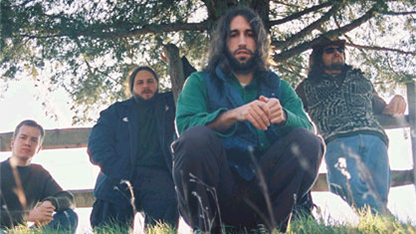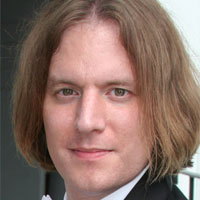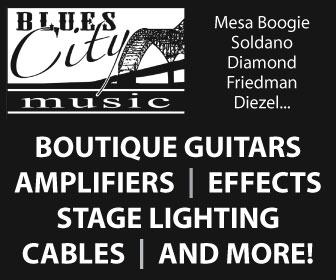Mike Tichy
Self-Reflections On His Self-Titled Debut

Success is something everyone needs to personally define for themselves. For some, money is their measure, for others it's reaching the top of their profession and others achieve success through the love of their spouse and family.
There is no greater futility than attempting to define another's view of success. Sometimes, simply being and doing something that one really loves, that brings fulfillment into one's life.
Mike Tichy's musical path has been set since he was a little kid. The northern New Jersey native has spent his life honing his craft as a songwriter, recording and performing in whatever styles caught his ear at the time, and blending them together into a unique sound.
He gravitated to the New York City scene, playing for several years with the band Scooby Groove. After that band broke up, Tichy was unsure of where he would to go next, but knew that he wanted to continue to expand on his musical horizons and gain greater experience with music theory. He set off for Boston to study at the Berklee School of Music.
After completing his studies, he returned to New Jersey to continue his musical development. He began recording music and reacquainting himself with the local scene. Along the way, he met and joined Moony Suzuki, a up-and-coming act generating a great deal of industry buzz. They needed a bassist, and Tichy fit the bill.
For about two years, Tichy toured with the increasingly popular Suzuki, who were getting mainstream music attention in the likes of Rolling Stone and Spin, and well as television exposure on Mtv and the Late, Late Show. While the band's work ethic and devotion to constant touring were admirable and bringing the band increasing national recognition, it didn't allow Tichy to do the two things he loves the most: songwriting and playing guitar.
After leaving Moony Suzuki, Tichy returned to the recordings he had made on his own, and developed them into his debut full-length CD, "self-titled". The bare-boned production and recording style serve to show off the complexity and diversity of the music itself. Tichy's talent and appeal as a songwriter are evident.
But even that recording, however recent, is a but step on the road of Tichy's creative development. He has put together a full band, consisting of Joe Vigliotti on bass, Mike Catapano on drums and Mike Low on guitar, who have given the music a move lively and rocking feel when performed live. With his experience as a solo performer and on tour with a national act, coupled with his formal training, Tichy has the wisdom needed to build on these steps to achieve musical success. With his first formal album, and the "coolest band in the world" to back him up, he's doing so on his own terms. And that, truly, is success.
The CD booklet for "self-titled" doesn't say much about when and where the tracks were recorded. Give us a little background on how the album was put together and what sort of equipment was used to record it. Did you do your own engineering?
I had actually made two CDs before this. The first, which I titled "pop core", I recorded in 2000 on my computer (I'd never used a computer before this, so these recordings were my learning experience.) Then, in 2002, I finished my second CD, which I left untitled. I'd burn copies of these at home and hand them out to every person that I could when I'd play. "Self-titled" is a combination of those two CDs, with the songs that we are still playing out live, and the first one to have a cover, lyrics and artwork. I had to make something more professional-looking to get to the next level and be taken more seriously.
I recorded and mixed it all myself, in my bedroom using Cakewalk, and then had it mastered by Chris Haggertty at Battery Studios in NYC. I also played all the instruments aside from the upright bass on "UFO," which was done by my bass player, Joe Vigliotti, and the tablas [an Indian drum] were played by my friend Subir.
How did you first become involved with performing, and make the decision to pursue music as your life's work? How did you make a decision to enter the Berklee College of Music and what was your career ambition upon entering school?
Up until I was, like, 13 I was positive that I'd wind up being a baseball player. I'd practice pitching, hitting and fielding all day. My logic was that there was no way that I wouldn't succeed if I was playing at all times.
In 7th grade, I focused that attitude toward the guitar. Two years later, I started playing in my first band called Scooby Groove, a real technical, funk, groove band. I played in that band for six years and then I really thought that's what I'd be doing for the rest of my life.
When we split, I didn't know what to do so I decided to go to Berklee. I don't think I really went there thinking too much about a career in music. I just wanted to learn everything that I could. I got really into the Beatles, Elton John and Otis Redding at that time and being that it's a heavy jazz school I was turned onto guys like Wes Montgomery and John Coltrane.
As a teenager, you performed with several bands around the area, and spent a lot of time learning the business in New York City clubs. How did you adjust to a formal structured environment at Berklee, and did you find yourself with a different attitude from other students there who perhaps didn't have the street experience that you did?
Honestly, I think there were a lot of kids in the same boat as me at Berklee. It was really hard at first cause I'd gotten really comfortable playing a certain style, and being the "good" guitar player in my little town. When I got to Berklee, within like two weeks, I realized where I was at. There were hundreds of better guitarist than me, a ton of kids doing the style I did, but better, and a lot of people who'd been playing out since they were kids; so anything that I'd done wasn't really that unusual there.
After I adjusted to the environment, I adapted to the formal training pretty quickly. I was so interested in it at that time so it didn't feel like work at all and it was just very inspiring.
Looking back on your formal education at Berklee, and your informal experience playing clubs around and area and networking, which do you feel has been more beneficial towards achieving your musical goals? Do you feel that you have an advantage of having both types of experience to build upon?
Well, since my real musical goal is to just make music that I'd like to hear, I'd say that Berklee was more beneficial. The more understanding I have of music "theory," the easier it is to make the sound that I want.
Personally, I feel that I have an advantage 'cause I have a good understanding of music and am pretty well-rounded in being able to play different styles, at least if I work at it for a little bit. At the same time, in this business, that is somewhat of a disadvantage. It's very hard for me to make music that fits into a specific category without feeling so repetitive and getting bored. People say that "self-titled" switches styles too much, but, honestly, this is the most relative thing I've ever done.
There are some many songs that I didn't put on the record 'cause they didn't fit at all. Other bands I've been in where I wrote, wound up having some ten-minute instrumentals, some be-bop songs, as well as a strict blues song, a heavy Soundgarden-ish thing, and some pop songs. Kinda whatever I was into that week.
One of your early breaks upon returning to the local scene was meeting Andy Gesner of Artist Amplification, and having your music included on their compilation CDs. How have you benefited from your relationship with Artist Amp, and what are its contributions to musicians on the local scene?
I've totally benefited from Artist Amp. Andy Gesner was working at the door the first time I ever played my songs out. It was at Doll's Place in New Brunswick opening up for a band called Barbuda that I was a fan of.
After I played, Andy asked if he could use my song "Dr. Said" on his first compilation CD and had me play some shows with other Artist Amp bands. I was so excited. Since then I've played some of the really good places in the area like Maxwell's, in Hoboken, Arlene Grocery, and The Fez in NYC, and become somewhat friendly with a lot of people and other cool bands all because of Andy Gesner.
Over the past few years Artist Amp has become this big family of bands playing together and being friends. It's kinda its own little scene. It is the organization that every band wishes was around, but it usually doesn't exist where they are. Here it does, though, at 2 Dreager Place in South River. Andy is the guy I call when I have questions and want advice. I can do a whole interview just talking about him. Maybe another time. (Laughs.)
You had quite a ride when you toured for several months with The Mooney Suzuki. What lessons about the music industry did you learn during your time with the band? Did you learn anything about yourself looking back on the experience?
The main lesson is to be nice to everyone. Every little connection helps. You never know who you're gonna run into again down the road or who knows who.
About myself, I guess I learned that I really don't want the fame for the sake of being famous. I think I already knew that though, but it was reassuring. It'd be great to be known for what I do.
Some would question why you would leave a band getting TV exposure and media buzz. When you say that you wanted to pursue your own music and your "own trajectory", are you indicating a certain aversion to media attention and "rock star" success, or was the way that success was coming about what made you uncomfortable?
When I read that I said "I wanted to pursue my own trajectory" I honestly had to go look that word up in the dictionary. (Laughs.)
The truth is that I wasn't happy not playing the guitar and writing music. That's what I've always done, so I wanted to get back to it.
I can't say that I don't want media attention or "rock star" success 'cause I've never really had much of it to complain about. Right now, I want all the attention that I can get for what I do. I'd like to be as successful as possible, while still playing what I consider to be good music.
Now back on your own, you've put together the "coolest band in the world" and are back to supporting your own music. Did working with The Mooney Suzuki make you feel that being part of a band was where you wanted to be, as opposed to strictly a solo performer? Do you enjoy being part of a more collaborative unit?
The "coolest band in the world" thing comes from me hearing the band start playing on top of my new songs in rehearsal and me saying "oh, that sounds so cool". We used that phrase on a flyer once 'cause it looked funny to us.
The band consists of Joe Vigliotti on bass and Mike Catapano on the drums. Us three have been playing together for a long time. We were in a band called "Patel" from '98 to 2000. On second guitar is Mike Low, who was actually a guitar student of mine 'til he began playing in the band. Yes, it is three Mikes and a Joe.
I've always loved playing in bands. I did "self-titled" by myself for the fun of it. I'd come home from work everyday and record. It wasn't originally supposed to be an album. If it was, I probably would have done it with the band. At first, I only played out as a solo performer 'cause it just happened to be at a time when no one was around. Joe was in school, Mike Catapano was playing with another band, and Low was just the guitar student I had that could help me with computer problems.
Has your songwriting style changed at all now that you're writing music to be performed by a group? How do you feel your songwriting has progressed from your solo days to "self-titled"?
I don't think my songwriting has changed too much because of the band. It has changed, but I don't think it's from being in a band. It is constantly changing. I'm always going through different phases for whatever reason. It may have to do with what I'm listening to, who I'm spending time with, or whatever may be going on in my life. I usually have the songs completed before the band starts working on them, though. The overall arrangements are different now. They tend to be more energetic than before because we are arranging the songs as a band rather than me laying instruments on top of the acoustic guitar.
Have you continued to write new music, and are there songs that have been worked into your live set that are laying the foundation for a follow-up album? Have you formulated any new recording plans?
Yes, we have been playing new songs for a while now. "Oh However" and "Gloria" are more upbeat and rhythmic songs that we've been doing in the live set for like six months or so. "Utah" and "Anonymous" are the titles of two on the softer side. We have started the recording already.
This album will be a band collaboration. Its going to have a more country-blues side to it, similar to "UFO" on "self-titled". Joe and I have been doing a lot of listening to Elton John's "Tumbleweed Connection" over the past year, which has a similar feel. We are still recording and mixing at my house because we'd like to spend as much time as possible experimenting.
Being an underdog is a recurring theme in your songwriting, yet you clearly show persistence and an idea of what you're looking to achieve. Do you feel that you're doomed to remain an underdog for your career, or that you'll achieve a level of stardom on your own? How far do you hope to take your music?
The underdog theme is not necessarily referring to myself. I always liked the story of the underdog defeating the odds and I'm always rooting for the underdog. I don't know why. When I turn on a boxing match I always want the guy losing to win. Two of my favorite movies are Rocky and The Karate Kid.
I guess in relation to the music industry I am the underdog. I do so many things that are frowned upon. For one, the songs don't follow the basic verse, chorus, verse, chorus format. I have this thing that I've learned to really like of putting the bridge of the song after the first chorus rather than the second. Examples of this are in "Palatine" and "Picture Perfect."
Also, the lyrics are more to make the song sound good or set a mood or image of a situation rather then to tell a story. A lot of times I'll choose certain words over others just because the syllables flow better. If I were telling a story or writing a book I'd do it differently, but for writing a song the sound is more important to me.
Also, my songs sound very different from one another which is a no-no in the music industry. I can't help it, though. I get bored doing the same thing over and over again.
I don't feel like I'm doomed to remain the underdog. What sells in music is changing so much nowadays. I hope to think that what we do somehow relates to what is considered "cool" soon. I think our music is catchy and commercial enough to attract a big audience. We'd like to be as big as Elton John, James Taylor or Bruce Springsteen.
If not, we'll remain the underdogs trying to beat the odds and love doing it.
[ Website: www.miketichy.com ]

Matt Mrowicki founded Chorus and Verse in 2001. He is a rock star designer and technologist, Internet professional, content creator, and entrepreneur specializing in web development, IT consulting, branding, social media and online marketing. www.imprtech.com









